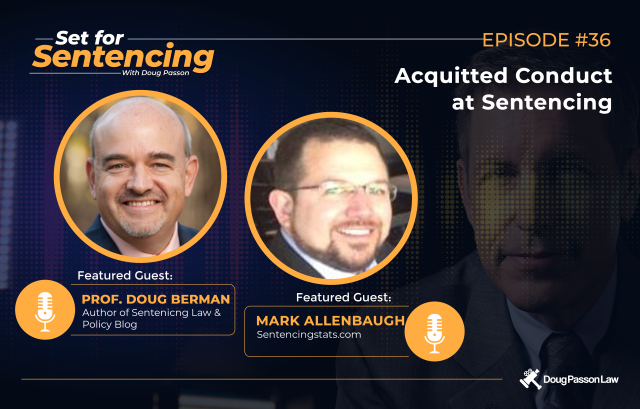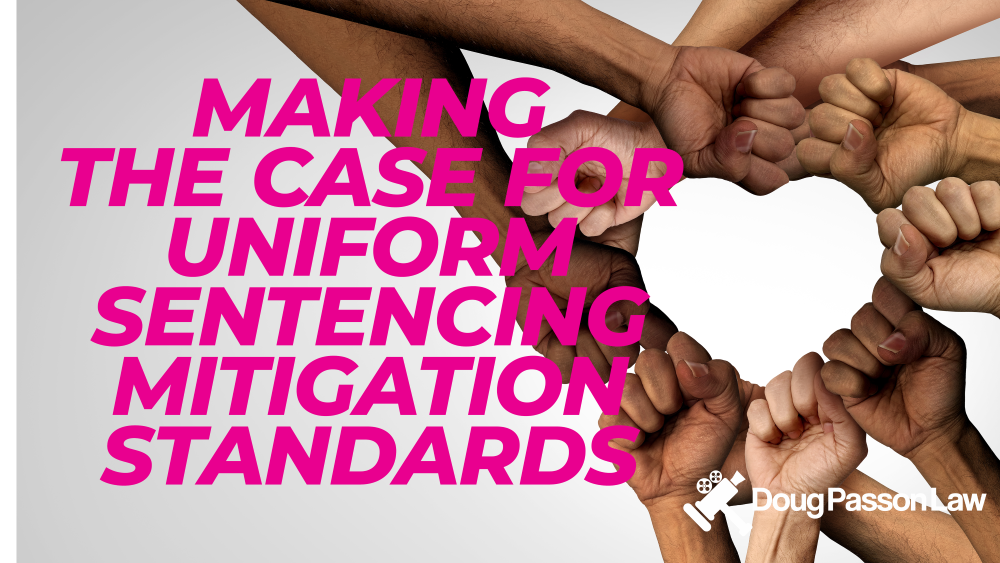PRESUMED GUILTY: Using Acquitted, Dismissed, and Uncharged Conduct to Increase Sentences.

Watch this episode on YOUTUBE, on APPLE PODCASTS, or wherever you get your podcasts!
In a perfect world, the presumption of innocence is sacrosanct. If you are found not guilty by a jury, common sense and the constitution dictate that acquitted conduct should not later be used to enhance your sentence on other charges. But in federal court, it is not only possible, but commonplace to increase punishment based on acquited, uncharged and dismissed conduct. The good news is, that might be changing soon.
Helping us get set for sentencing, Prof. Doug Berman and Mark Allenbaugh to talk about the proposed amendment to the United States Sentencing Guidelines on acquitted conduct. Prof. Berman is not only a federal sentencing expert, but wrote the Amicus brief for U.S. v. Daytona McClinton, an “acquitted conduct” case currently pending Cert. at the Supreme Court. Of course, we all know Mark Allenbaugh (www.sentencingstats.com) who completes what turns out to be an “all Allenbaugh January”.
Warning: this episode is not for the faint of heart. No, there’s no sex, drugs, or rock n’ roll. There are probably not even that many f-bombs dropped by Doug. It’s just a really, really, really deep dive into the inner machinations of our broken federal sentencing process. So strap in, and let’s get Set for Sentencing!
In this episode:
- The pervasiveness of acquitted conduct enhancements;
- Acquitted conduct’s role in coercive plea bargaining;
- The five cases waiting to be heard by the Supreme Court;
- Why using acquitted conduct to enhance punishment flies in the face of the presumption of innocence;
- The Watts case and the shaky origin story of acquitted conduct;
- A debate over how many cases this really affects;
- Burdens of proof at sentencing;
- Looking at the Derek Chauvin sentencing to see how proof beyond a reasonable doubt for sentencing enhancements can and should work;
- The possible broader implications for dismissed and uncharged conduct enhancements to fall along with acquitted conduct;
- What you can do to help get these amendments ratified.
LINKS:
Full list of Proposed Sentencing Guidelines amendments: https://www.ussc.gov/sites/default/files/pdf/amendment-process/reader-friendly-amendments/20230112_prelim_RF.pdf?utm_medium=email&utm_source=govdelivery
WHAT YOU CAN DO: Believe it or not, your input matters. You can (and should) go to the sentencing commission website and submit a comment here:
There, you’ll find a new portal that allows you to easily submit comments on all proposed guideline amendments. The commission is listening, and they absolutely want to hear from you.
RELATED EPISODES:
Berman’s Sentencing Law and Policy Blog:
https://sentencing.typepad.com/sentencing_law_and_policy/
Mark Allenbaugh: www.sentencingstats.com
Sharing is caring!



